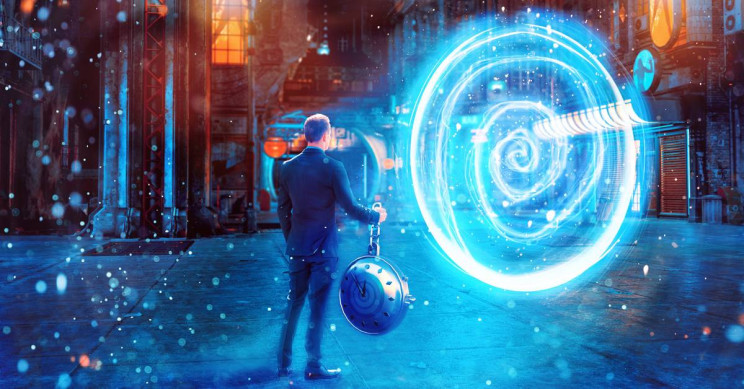Today (Dec 13) I am flying home after my first term at St Andrews. It feels like time has sped up ever since I arrived. An hour seems a bit shorter than I remembered in the States. Whole weeks have felt like insignificant blocks of time that pass by all too quickly. Why does time seem so relative? For others I’m sure time might appear to creep along slowly. As is often said, “time flies when you’re having fun,” and it has certainly flown by since I arrived in Scotland. Well today I am flying home. Since I am leaving Edinburgh at 11am and will arrive in Los Angeles at 10pm local time. Since I am 8 hours ahead of Pacific Standard Time, Tuesday December 13th will be a 32 hour day for me. On this, perhaps the single longest day of my life, I thought I’d reflect a bit on the idea of time travel.
If you’re at all nerdy like me you might enjoy movies and books that include time travel. Interestingly, there are many examples of this, but not all of them are uniform in expression [I should note that there are some spoilers ahead]. LOST fans will recall the wonderful experience of Season 5. There the mythology of time travel centered on the premise that the past cannot be undone. What happened, happened. No matter what a character did in the past, history had always played out that way, even though they did not realize their role in the event. However, this is not always how time travel is conceived. In Back to the Future, the movie opens with the murder of the scientist who invented the DeLorean (“Doc”), but after Marty goes back to 1955 he is able to warn the Doc about his 1985 murder. Thus, in this version, the past can be undone. This type of time travel is picked up in Harry Potter and the Prisoner of Azakaban where the use of time travel allowed Hermione to accomplish multiple tasks at once, and even allowed the characters to undo an undesired outcome (the killing of Buckbeak). Another type of time travel is the kind where no direct contact is possible. This is the kind of time travel in Charles Dickens’ A Christmas Carol where Mr. Scrooge is able to see scenes from his past, present and future. Of course, by going back to the present Mr. Scrooge is able to undo the eventual death of Tiny Tim as well as his own demise. But during his experience of time travel, he is unable to alter the state of affairs.
When I was thirteen years old I wrote, directed, and starred in the Christmas play at my church (wow, now I sound way too much like Tommy Wiseau). Being young and heavily influenced by Star Wars, I decided to make the Christmas play a tale of time-travelling teenagers who go back to witness the first Christmas for themselves. The type of time travel I utilized was more comparable to A Christmas Carol, the teens were simply observing Jesus’ birth. Well needless to say, the Christmas play was terrible. Of course, I imagine many present in the congregation asked themselves, What does time travel have to do with Christmas? And this may very well seem like a reasonable question to ask, but I want to suggest that this question is particularly relevant for Christmas.
I would like to suggest that the first Christmas is the best expression of time travel. In fact, it’s the only actual instance in history when such a thing occurred. The issue of God and Time is far too complex to seriously address here. I should say though that many Christians would disagree with me on this (e.g. William Lane Craig). However, I remain unconvinced that God is within time. I believe that God created all things, including time. The Bible appears to affirm, at least to me, that God is not bound by time (e.g. Ps 90.2). And lest you think it is belittling to talk about time travel in this context, consider the implications this has for a high christology. Images from Phil 2 naturally come to mind in this reflection. If I am right about this, the idea of an eternal person taking on human flesh and entering into the realm of the temporal and the ephemeral is truly time travel.





6 Comments
Leave your reply.